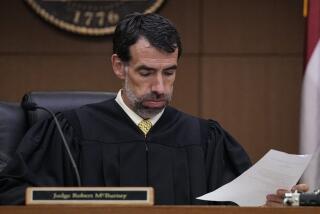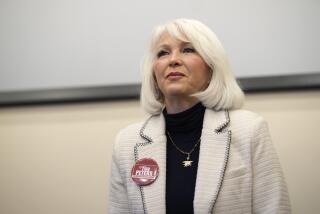Case Lands Back in Lap of Well-Respected Judge Lewis
- Share via
Terry P. Lewis should be used to this role by now.
A quiet scholar and murder-mystery writer, the Leon County Circuit Court judge has been peering over the shoulders of Florida vote-counters almost since election day.
Lewis, who embraces North Florida’s relaxed style and is known for entering his courtroom sans the traditional black robe, was assigned late Friday to oversee a manual recount of undervotes ordered by the Florida Supreme Court.
Within hours, Lewis--in his black robe--was presiding over a court session in which lawyers for Vice President Al Gore and Texas Gov. George W. Bush sought to map out how that recount would proceed.
“He’s probably as respected a judge as we have in this community,” said Steven Uhlfelder, who heads the public law division for the Holland & Knight law firm in Tallahassee, Fla. “He’s thoughtful, he’s bright, he’s decisive. I think he’s the right person to be dealing with what’s going on right now.”
Lewis, 48, received the case after the Florida Supreme Court overruled Leon County Circuit Judge N. Sanders Sauls, who then recused himself from overseeing the manual recount.
Under Leon County’s system of rotating assignments, Circuit Judge Nikki Ann Clark’s name came up, but she was unavailable, court officials said.
The case then fell to Lewis, who already has issued two key rulings in the protracted wrestling match over the Florida vote count.
Earlier Friday, Lewis joined Clark to reject Democrats’ contentions that election officials in Martin and Seminole counties tainted absentee vote pools by allowing Republican Party officials to add voter identification numbers to voters’ requests for absentee ballots.
And last month, Lewis upheld Florida Secretary of State Katherine Harris’ authority to reject or approve vote tallies submitted by counties after the state deadline of Nov. 14. The Florida Supreme Court overruled him, but the U.S. Supreme Court vacated that decision earlier this week.
“He’s very good, and he’s very careful,” said Robert C. Apgar, a Tallahassee attorney and fellow alumni of Florida State University College of Law.
That carefulness was evidenced in October 1999. Lewis, assigned a case in which Florida’s teachers unions were contesting a state school voucher law, recused himself at the request of lawyers for Gov. Jeb Bush--the Texas governor’s brother--because Lewis’ wife is a school guidance counselor.
Appointed to the Circuit Court by then-Democratic Gov. Lawton Chiles in 1988, Lewis has juggled his share of controversial cases. In July 1999, he ruled against a new state law requiring doctors to notify parents when girls under age 18 came to them seeking abortions.
Outside the courtroom, Lewis involves himself with legal education issues through the Florida Judicial College and the College of Advanced Judicial Studies. He also volunteers with youth court programs, including mock trial competitions.
Even in Lewis’ fiction, courtrooms are close at hand. His “Conflict of Interest,” a novel published in 1997 through the Sarasota, Fla.-based Pineapple Press, follows an alcoholic trial lawyer assigned to a high-profile murder case who is threatened with blackmail over his secret romantic relationship with the victim--a newspaper reporter.
A Request for Candid Lawyers
Lewis received his law degree in 1976 and was admitted to the bar the same year. In a profile listed with the Young Lawyers Division of the Florida Bar Assn., Lewis warned that he preferred motions to be double-spaced with the “pertinent portions of authorities” highlighted and that lawyers who come before him should be prepared.
“Keep your perspective and focus on what is important,” he wrote. “Be candid and forthright with representation of law in fact--the reputation of a career may be made in the misconduct of a moment.”
*
Times staff writer Michael Finnegan in Tallahassee contributed to this story.
More to Read
Sign up for Essential California
The most important California stories and recommendations in your inbox every morning.
You may occasionally receive promotional content from the Los Angeles Times.














